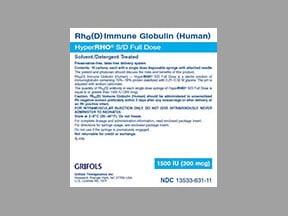
Hyperrho S/d Coupons & Savings Card – Discount Prices from $2553.15
My prescription
Edit
1500UNIT, Hyperrho S/d (30 Solution Prefilled Syringes)
Select pharmacy

Walgreens
$2553.15
COUPON PRICE
Albertsons
$4773.00
COUPON PRICEHyperrho S/d savings card
Show this card to your pharmacist
Walgreens
$2553.15
BIN
ID
PCN
GRP
015995
LHKKD918865
GDC
DR33
Powered by
More prescriptions for immunodeficiency
More prescriptions for immunodeficiency
Price history for Hyperrho S/d (generic)
30, 1500UNIT
Average retail price for Hyperrho S/d
Average SaveHealth price for Hyperrho S/d
Our price history data is based on aggregated prescription data collected from participating pharmacies in America. Our prescription data updates daily to reflect the latest price changes. If you notice a missing data point, it means there wasn't sufficient data available to generate a monetary value for that date.
Hyperrho S/d dosage forms
| Dosage | Quantity | Price from | Per unit |
|---|---|---|---|
| 250UNIT | 30 Solution Prefilled Syringes | $882.63 | $29.42 |
| 1500UNIT | 30 Solution Prefilled Syringes | $2466.07 | $82.20 |
Hyperrho S/d Warnings
This document outlines critical safety information and warnings associated with the use of RhoGAM. Please read thoroughly and consult your healthcare provider if you have any concerns or questions.
Serious Allergic Reactions: RhoGAM can occasionally trigger severe allergic reactions. Individuals lacking IgA antibodies are at increased risk due to the presence of trace amounts of IgA in RhoGAM. These reactions can occur even if prior doses were tolerated. Healthcare providers will monitor patients for at least 20 minutes after administration. Be alert for symptoms such as wheezing, chest tightness, difficulty breathing, low blood pressure, dizziness, vomiting, itchy rash, hives, or swelling of the tongue or throat. Immediate medical attention is crucial if these symptoms appear.
Risk of Infections: As RhoGAM is derived from human blood products, there is a minimal risk of transmitting viruses or proteins like variant Creutzfeldt-Jakob disease (vCJD). Blood donors undergo thorough screening, and all samples are rigorously tested to minimize infection risks. Report any signs of infection to your healthcare provider immediately. Discuss the potential benefits and risks of RhoGAM with your healthcare team.
Red Blood Cell Breakdown: Individuals with Rh-positive blood may experience the breakdown of red blood cells post-administration. Healthcare providers will monitor for hematologic issues. Alert your care team if you develop fever, back pain, nausea, vomiting, shaking, chills, changes in blood pressure, discolored urine, or blood in urine. Since symptoms may not be immediate, report any delayed occurrences.
Vaccine Interactions: RhoGAM may interfere with the efficacy of live vaccines such as MMR (measles, mumps, and rubella) and Varivax (varicella). The antibodies in RhoGAM can diminish the immune response to these vaccines and increase infection risk. Live vaccines are typically not recommended within 12 weeks of receiving RhoGAM. If you have recently given birth and need the MMR vaccine, a blood test after 12 weeks is necessary to confirm vaccine effectiveness. Discuss your vaccination timeline with your healthcare provider before receiving RhoGAM.
Contraindications:
- Individuals with Rh-positive blood.
- History of allergic reactions to human immunoglobulin products.
Consult your healthcare provider if any of these contraindications apply to you before proceeding with this medication.
Hyperrho S/d Side Effects
Common side effects:
- Reactions at the injection site (swelling, redness, pain, tenderness)
- Mild fever
- Skin rash
Body aches
Serious side effects:
- Severe allergic reactions (wheezing, chest tightness, trouble breathing, low blood pressure, dizziness, vomiting, itchy rash, hives, swelling of the tongue or throat)
- Breakdown of red blood cells (fever, back pain, nausea, vomiting, shaking, chills, changes in blood pressure, discolored or bloody urine)
What is HyperRHO used for?
HyperRHO is used to prevent Rh immunization in Rh-negative individuals who have been exposed to Rh-positive blood. It is commonly administered to Rh-negative pregnant women to prevent hemolytic disease of the newborn in future pregnancies.
How much does HyperRHO cost?
The cost of HyperRHO can vary depending on factors such as the pharmacy, location, and whether the patient has insurance coverage. It is recommended to contact local pharmacies or healthcare providers for the most accurate and up-to-date pricing information.
What is HyperRHO injection?
HyperRHO S/D is an injection containing Rh0(D) immune globulin. It is used to prevent Rh immunization, which can occur when an Rh-negative individual is exposed to Rh-positive blood. This is particularly important during pregnancy, as it helps prevent hemolytic disease of the newborn in future pregnancies.
